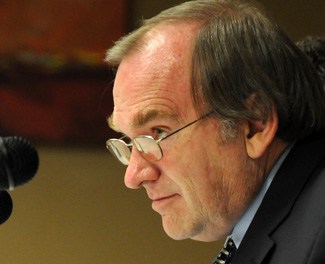
King, shown here during Thursday’s meeting in Las Cruces. (Photo by Heath Haussamen)
AG shares planned reform bills with legislative committee at meeting in Las Cruces
Attorney General Gary King plans to push a number of ethics-reform proposals during the 30-day session of the Legislature that begins in January, and at the top of his list is the creation of an independent ethics commission.
“We support the creation of an independent state ethics commission,” King told lawmakers Thursday during a committee meeting in Las Cruces.
King has been among those pushing unsuccessfully in recent years for creation of such a commission. This year, a subcommittee of the Courts, Corrections and Justice Committee — the same committee to which King spoke Thursday — is trying to craft a new proposal that actually has a chance of being approved in the Senate, where such bills have died in recent years.
The state’s top law-enforcement officer told legislators on Thursday that, while he supports giving such a commission subpoena power and some level of “enforcement authority,” he suspects the bill that emerges may instead have the authority only to serve as an advisory committee.
The ethics commission bill is one of five King hopes to push in the 2010 regular session. The others are:
• A whistleblower protection bill that would protect employees of a state agency who reveal wrongdoing in that agency from retaliation.
• A change in the lobbyist registration act. Currently, the law only requires people who lobby the Legislature to register as lobbyists, report their expenditures and maintain a public list of clients. King wants the act to also apply to people who lobby the executive branch for state contracts.
• Making the provisions in the Governmental Conduct Act apply to local governments as well as state agencies.
• Closing what King called a “pay-to-play” loophole in the procurement code by requiring those who bid on state contracts to disclose whether they’ve given campaign contributions to anyone who has the ability to influence the bidding process.
Discussion of the proposals
King said Thursday he believes there’s a good chance the whistleblower protection act will pass. Both the House and Senate have approved slightly different versions in the past, but a bill has never gotten through both chambers before the Legislature adjourned.
On the proposed change to the lobbyist registration act, King said the issue is one of commonsense.
“If you’re spending a fair amount to influence the governor or a cabinet secretary, then you ought to do the same kinds of filings as if you’re trying to influence a legislator,” he said.
About the proposed change to the Governmental Conduct Act, Rep. Nate Cote, D-Organ, told King he has encountered a situation involving unethical activity at the local government level, but there was nothing that could be done because that local government had no rules governing ethical conduct.
“So I’m glad you’re pursuing doing something like this,” Cote told King.
The most substantive discussion came in response to the proposal to require disclosure of contributions by people bidding on state contracts. King is proposing that the bill also apply to contributions to entities such as university foundations when the donor is bidding on a contract at the relevant university.
That’s been an issue in Las Cruces because, in 2007, New Mexico State University started using money from a secret donor to provide compensation to its president and head basketball coach. University foundations aren’t required under state law to release donor lists, and NMSU refused to say who was helping with the compensation.
State Rep. Joseph Cervantes, D-Las Cruces, has pushed legislation in the past similar to what King is now proposing. Cervantes spoke on Thursday about the importance of the bill, noting that some wealthy developers were giving big to the NMSU Foundation around the same time that NMSU started using such donations to help with compensation for the high-ranking employees.
“It could be a real problem when you have people making anonymous contributions to the president’s compensation, to have those same people bidding for contracts,” Cervantes said.
King agreed.
“The best government is open government,” King said.
